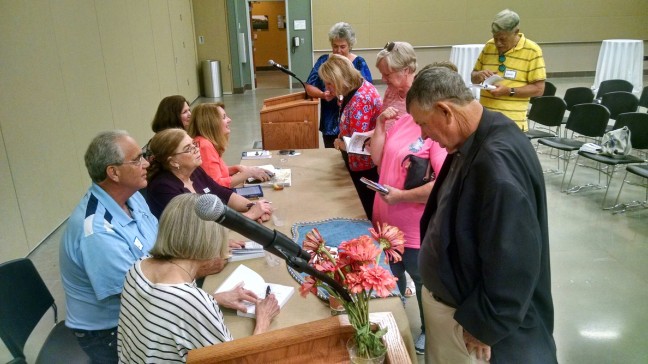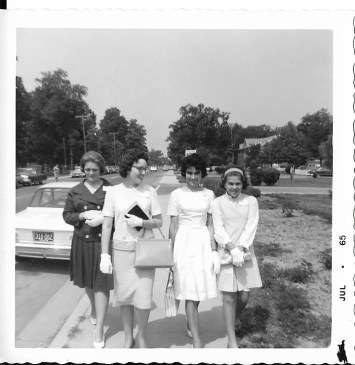
At the beginning of every new year, writers tend to think about beginnings–new resolutions, new inspiration and new directions. But as I started new work this month–particularly a story that recently bewildered me–I found myself struggling with endings.
Why are endings so hard? To help, I studied the final sentences of stories I admire.
“She walked up the stairs, tearing the note into tiny pieces that fluttered behind her like confetti.” Laurie Colwin, from “Children, Dogs, and Desperate Women.”
“I still seem to be holding that wisp of iridescence, not knowing exactly where to fit it, while she runs with her hoop ever faster around me and finally dissolves among the slender shadows cast on the graveled path by the interlaced arches of its low looped fence.” Vladimir Nabokov, “First Love.”
“But the pear tree was as lonely as ever and as full of flowers and as still.” Katherine Mansfield, “Bliss.”
“She sat for a while longer, then pulled the curtains back and the day came in. Hers was the ghost the night had brought, in her own image as she once had been.” William Trevor, “Sitting with the Dead.”
I also studied the words of some of my favorite writing teachers. Some say you should return to the beginning of your story and pick up a loose thread there to knot at the end. Others believe you should end on a strong image. John Dufresne, in his wonderful book The Lie That Tells A Truth says this is not the time to give us a moral or a message. “We only need the problem resolved.” And later: “End your story on your best, or second best, line. Don’t write past it. This is the line that echoes in our mind when the story is over.”
Anne Bernays and Pamela Painter, in their endlessly inspirational book What If, give a great exercise for endings. “Write one sentence for a story that is in its fourth or fifth draft. Then revise the story to heighten and illuminate this final meaning.”
As challenging as it can be, there is nothing like the inherent joy in writing stories–whether it’s that first sentence or even the title. And this makes the struggle worth it. Sometimes the very thing that’s holding us back IS the solution. One of my favorite philosophers, Marcus Aurelius, said it best: “The impediment to action advances the action. What stands in the way becomes the way.”
In my situation, it became very simple. The ending of my story troubled me because I hadn’t gotten the beginning or the middle right. So I had to backtrack a little bit. But when I followed the crumb trail of my original conception–what the story was REALLY about, I found my way home and then, and only then, resolved my story. And then I treated myself to a huge chunk of apple pie!
We’ll be doing a number of writing workshops very soon, where we’ll talk more about endings and everything in between. Stay tuned for the details, but in the meantime, I hope you’ll plan to join me in April for round two of our very popular flash fiction workshops.
Saturday, April 13 – Flash Fiction Boot Camp II Workshop. Central Carolina Community College Creative Writing Program in Pittsboro, N.C. Register here.

 Many thanks to the guest judges of
Many thanks to the guest judges of  For Halloween, Buster, our little corgi-mix, decided to try a new look. Born with a hastily-tied white “Ascot” around his neck, he decided to switch things up this year. So he’s preening around in a hot dog bun. Hold the onions, please.
For Halloween, Buster, our little corgi-mix, decided to try a new look. Born with a hastily-tied white “Ascot” around his neck, he decided to switch things up this year. So he’s preening around in a hot dog bun. Hold the onions, please. Our jalapeno peppers truly hit their stride this fall, blessing us with a bountiful crop, even in October. So why not put a little kick in your own writing? When I think of the unexpected, Shirley Jackson always comes to mind. In her short story,
Our jalapeno peppers truly hit their stride this fall, blessing us with a bountiful crop, even in October. So why not put a little kick in your own writing? When I think of the unexpected, Shirley Jackson always comes to mind. In her short story,  Gardening constantly surprises–with “volunteer” crops springing up in the most unexpected places. And this year, we had a volunteer loofah plant! When the seeds of last year’s crop fell through the deck, a new vine entwined its way up the retaining wall.
Gardening constantly surprises–with “volunteer” crops springing up in the most unexpected places. And this year, we had a volunteer loofah plant! When the seeds of last year’s crop fell through the deck, a new vine entwined its way up the retaining wall. From tales of raising Rameses (the UNC Mascot ram) to a first Mustang to warm biscuits on a blue Cameron woodstove, last night’s reading from the
From tales of raising Rameses (the UNC Mascot ram) to a first Mustang to warm biscuits on a blue Cameron woodstove, last night’s reading from the  poem features a romp through a haunted cherry orchard and an encounter with a waif-sprite with a fondness for sweet cherries.
poem features a romp through a haunted cherry orchard and an encounter with a waif-sprite with a fondness for sweet cherries. Living in the country makes it easy to channel my inner chicken on the tricky topic of submission.
Living in the country makes it easy to channel my inner chicken on the tricky topic of submission. We discussed
We discussed 
 Reinhardt
Reinhardt